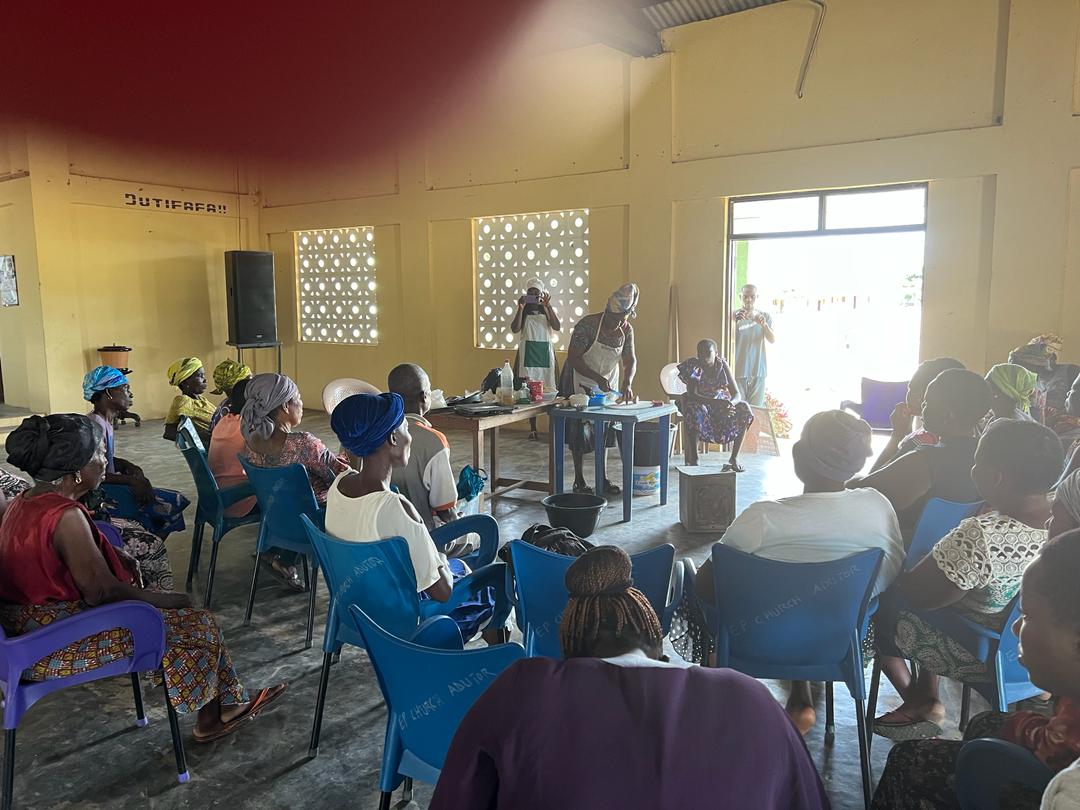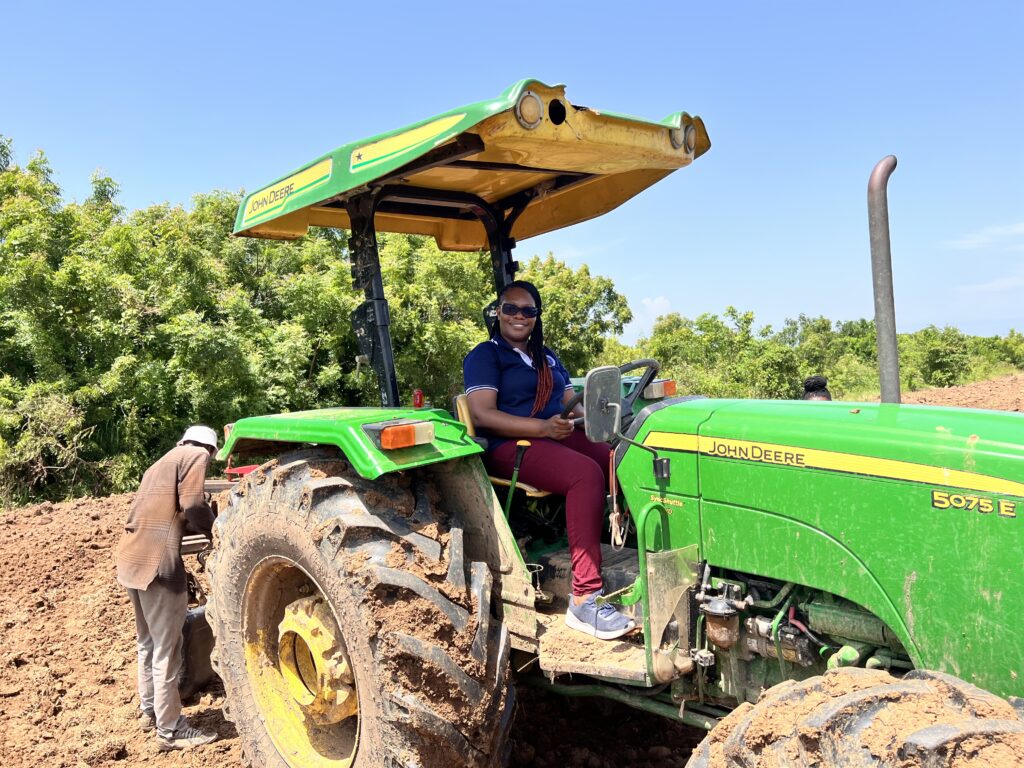The Need for Collective Action for Digital Tractor Lending Platforms in Ghana

Image: Focus group discussion with farmers, Volta region, Ghana
While globally there is an average of 200 tractors per 100km2 of arable land, in Sub-Saharan Africa, the number is between 13 and 27. The lack of access to tractors has serious consequences for farmers, resulting in under-cultivation and livelihood losses. Recently, the advancements in Information and Communication Technology infrastructure and the lowering costs of data created a number of opportunities for farmers across the agricultural value chain. ‘Uber for tractors’ is one such platform: an asset-sharing digital platform, it connects farmers with tractor owners willing to rent out their equipment for a fee. Termed ‘uberization of agricultural mechanization’, Uber-type matching platforms for farmers now include Hello Tractor in Nigeria, Rent-to-own in Zambia, Trotro Tractor in Ghana, and EM3, farMart, Trringo in India and Tanzania and many others.
‘Uber for tractors’ platforms are often framed as sharing economy institutions as they reduce the need for farmers to own physical infrastructure and assets such as agricultural machinery. At the same time, they also re-intermediate transactions by charging fees for their brokering services, controlling access and setting the rules of conduct between parties. While recent research has revealed that the Uber for Tractor model has more potential to address the needs of commercial farmers, they are still being marketed as a revolutionary tool for small holders.
For my ICDE fellowship project, I critically assess the potential of ‘Uber for tractors’ type digital platforms to facilitate access to tractors for smallholder farmers in rural Ghana. We compare these platforms with existing tractor hire arrangements delivered through farmer-based cooperative organizations (FBOs). Recent research shows that farmer-based cooperative organizations also use digital platforms for mobilization, communication, and coordination. We view agricultural mechanization as a collective action problem arising from competition for scarce tractor machines during short cultivation periods. Using a case study of the Volta region in Ghana, we examine and compare the potential of venture capital digital platforms (Uber for tractors model) and social digital platforms used by FBOs to facilitate access to mechanization for smallholder farmers.
Farmer groups have a long history in Ghanaian agriculture, dating back to pre-colonial times’ labor sharing arrangements. With the colonial administrators came the first externally imposed farmer cooperatives (mainly for cocoa), followed by state controlled collectives and market-driven group enterprises. Presently, there is an estimated 10 000 farmer-based organizations in Ghana, organized by either state agencies, non-profits or private investors who increasingly recognize the importance of collective action for agricultural development. These play various roles, at times in collaboration with the agricultural extension services, ranging from information services and the provisioning of agricultural inputs, to connecting farmers to markets – and to tractors.
Tractors are in high demand in Ghana: according to the estimates, only 8% to 16% of farming area in Ghana is mechanized, despite a number of state-led and market-led mechanization programs. Like many developing countries, over the years, the Ghanaian government established state-run, subsidized tractor hire schemes, but these largely failed once the government funds run out. The government-run system of for-profit Agricultural Mechanization Services Enterprise Centres (AMSECs) has also been declared inefficient as it suffers from the principal agent problem. Recently, tractor ownership has increased considerably especially among commercial farmers, who use tractors on their own land and also hire them out to others via peer renting. A direct consequence of a wider societal processes (the decline of the extended family compound farm and subsequent reorganization of farm labor), these new avenues for tractor hire are symptomatic of a new model of agricultural change with medium-scale farmers and mechanization acting as catalysts for agricultural commercialization.

Despite these developments, tractors remain scarce in most of Ghana: while medium- and large-scale farmers are able to take advantage of the new opportunities, mechanization services remain out of reach for the majority of small-holders. With farm sizes of less than 2 ha and often geographically dispersed, they are not considered viable clients: when fuel costs, time and potential risk of tractor damage on difficult terrain are factored in, catering to small-scale farmers is not profitable for AMSECs, or private tractor owners. For this reason, collective action is instrumental for smallholders to access mechanization services: as their farms are small and often spatially dispersed, effective communication and coordination of farming activities reduces the opportunity costs for tractor service providers. Neighboring small holders approach tractor owners as organised collectives that can present a larger ready-to-plough area and secure a competitive rate.
Seeing FBOs as cooperatives is, however, not fully accurate: while the smallholders are incentivised to collaborate, they are also competitors: in rainfed agriculture, the timing of ploughing is critical and needs to be completed within a small window to ensure high yields. Competition for machines during short cultivation periods triggers collective action problems, with farmers breaking ranks and approaching tractor operators with incentives to secure preferential timing. While the success of collective action relies on achieving a critical mass of participants who cooperate, the benefits are not distributed evenly, with further-off-farms usually being served last.
Effective collective action requires relationships of trust, norms of reciprocity and social institutions, translating into effective self-governance of cooperatives. Our previous research provided compelling evidence that these can be achieved not just through face-to-face, but also through digitally mediated relationships. Using an experimental public bads game where we manipulated farmers’ access to a voice communicator, we found that ICT communication has a significant positive effect on cooperative behavior, comparable to face-to-face studies. The observed communicative strategies: (1) facilitating complex coordination, (2) establishing collective norms, (3) pressuring ‘free riders’, and (4) managing reputation to increase trust; appear to be linked to the social institutions that Elinor Ostrom identified as conducive to collective action. Against this background, digitally enabled communication between FBO members holds considerable promise to attenuate collective action problems that often arise in agricultural systems.
Our team completed and in-depth ethnographic field study, conducting interviews with farmers, village leaders, extension officers, tractor owners and tractor operators in the Volta region between June and October 2023 and we are now in the process of data analysis.
Our early findings indicate that farmers use digital social media platforms to effectively communicate and coordinate with other FBO members, which positively impacts their chances of securing tractor access. We are now looking the mechanisms through which digital platforms impacts the communication, organization and coordination of FBOs. Second, in line with earlier research, our data reveal very little awareness and almost no use of ‘Uber for tractors’ digital platforms, and a strong preference for relying on kinship networks to secure tractor access through FBOs. Our findings indicate that the relatively straightforward operational model of the ‘Uber for tractors’ platform fails to account for both: the complexity of the mechanization issue, and the role of local institutions, such as FBOs, and was outscored by the existing cooperative system of tractor services brokerage. As such, they make us question the supposedly revolutionary potential of digital apps as a driving force of agricultural transition in developing countries, redirecting us back to the persistent dilemma of collective action. Ever since COP28 ‘put food back on the table’ the challenge of agricultural transition in developing countries have returned to the forefront of policymakers’ agenda. Among these, the stalling progress of agricultural mechanization certainly merits further research.
My fellowship work comes out of a collaborative project between University of Manchester, University of Wageningen and University of Ghana. The team on this project also includes Dr Comfort Freeman, Prof. Cees Leewis, Dr Mariette McCampbell, Dr Nyamwaya Munthali and PhD Candidates: Naa Aku Mingle, Delali Woledzi and Ebenezer Ngissah. The project received funding from the University of Wageningen, the Cambridge Philomathia Social Science Foundation and the International Science Partnerships Fund Institutional Support Grant (ODA) funding 2023 to 2024.
If you work on similar topics, please reach out.